
by Peter Capstick
Reprinted from
Guns & Ammo Magazine, October 1984 issue
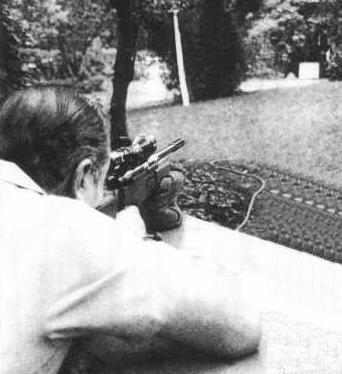 The five dead snipers lay half hidden in pale autumn grass, their
bullet-torn bodies shadowy in the late African sunshine. Behind
and above them the gray rocks gleamed with fresh bullet scars as
I tried to find the last enemy marksman through the big scope.
The rippling river of mirage had settled now, and I caught the
outline of the man quickly, trying to steady the crosshairs over
the thump of twitch of my heart. Letting out my shooting breath
I held on his right ear, allowing for the slight wind drift. The
corrugation of the trigger surface felt like a wood rasp under my
fingertip as I began to squeeze. Both eyes open to catch the
sneakiest shift of breeze, I sensed the delicate trigger break an
the almost silent weapon fired.
The five dead snipers lay half hidden in pale autumn grass, their
bullet-torn bodies shadowy in the late African sunshine. Behind
and above them the gray rocks gleamed with fresh bullet scars as
I tried to find the last enemy marksman through the big scope.
The rippling river of mirage had settled now, and I caught the
outline of the man quickly, trying to steady the crosshairs over
the thump of twitch of my heart. Letting out my shooting breath
I held on his right ear, allowing for the slight wind drift. The
corrugation of the trigger surface felt like a wood rasp under my
fingertip as I began to squeeze. Both eyes open to catch the
sneakiest shift of breeze, I sensed the delicate trigger break an
the almost silent weapon fired.
The flash of the bullet was actually visible through the brassy shafts of sunlight, the recoilless, precision weapon sounding its dull death-snap. With an echoed thump the slug passed completely across the front of the sniper to inlay a silver splash of lead just to his right and slightly low. Less than a second later I saw the gust of wind that had blown my round off-line. Too late. If you can't see it, you can't hold off for it.
"Hoo, Hah!" delicately intoned the Chief of the Air Force.
"Another tie," deadpanned the former Secretary for Defense, rubbing his hands in unalloyed glee.
"I thought Capstick told us he'd trained on Apaches or something," Observed the head of the Army Advanced Marksmanship unit.
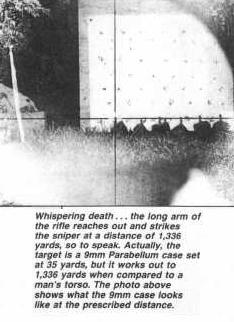
Placing my sniping rifle back in the rack, I said "All in the name of international relations, gentlemen. My heart belongs to the State Department. Anyway, sometimes I just can't stand the idea of taking human life." Putting on my now badly gravity-damaged Look of Eagles, I wandered off downrange to administer first aid under the Geneva Convention and setup the enemy snipers for the next shooter.
You aren't behind the barricades in Beiruit, and it's not Afghanistan or even the Great War. It's South Africa and the name of the game is "MiniSniping". I put it to you that if you will take the time, money and very small trouble to try it, you will find your shooting life enriched possibly several hundredfold. I'm not being cute and that's not idle talk if you love precision shooting - but let's start at the beginning.
I never really realized the international stature of G&A until I moved to South Africa in November of 1982. I was hardly out of jet-lag before I discovered that the place was stiff with professional small boys just like me, some of whom had read various travesties of literature I have portrayed in these pages over the years. Hardly had I eaten a half-kilo of biltong and caused not inconsiderable amount of that beautiful Cape wine to disappear by merely waving my tongue over it, than I was asked out to "our little club" by a senior serving officer who was an old family friend of my wife.
Well, what would you expect of an African rifleman's club? I figured on double .600 Nitros, some .577s, certainly some triple-digit Gibbs in classic style and a slather of .375 H&H fare. Probably there would be some .404s integrating with a bunch of night breeding metric stuff out of Bwana Mauser. Nope. The rack was stacked with those weird Olympic-style airguns that we've all seen advertised but never believed that anybody actually bought. I never had any personal interest in getting rigged up in a shooting jacket with enough padding to get you through a head-on with a Greyhound bus all the while toting a Star Wars BB gun to shoot little holes in a piece of paper at 10 meters, all that indoors, too. Still, just as has been the case with bonded bourbon and other items that are acquired tastes, I have learned a lot recently.
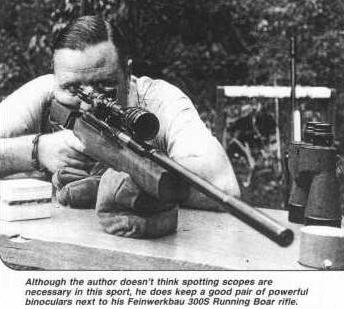
Hey, if you like to shoot and appreciate a rifle that will perform better than you do, give me a couple minutes and I'll tell you why an ex-professional African hunter who never even kissed his horse spends two afternoons - eight hours - a week MiniSniping when I could be in the actual bushveld in far less than an hour from home. MiniSniping is the field sport of using ultra-precision .177 caliber airguns outdoors in a scaled-down version of metallic silhouette of falling plate shooting with centerfires. If that makes it sound like a sissy sport, let me point out a few aspects of it that might give a better insight.
The targets we shot are generally 9mm empty cartridge cases steadied by a base of modeling clay, or, as it's called here, plasticene. You will recall the stuff as the gummy crud your mother was always picking out of your hair when you got bored with molding turkeys and pilgrims in fourth grade, and discovered that a pellet of it worked very nicely in cool weather in both your slingshot and peashooter. In any case, 9mm cases are unbelievably small, precise targets at 35 yards, but to find just how relatively small they were I had to actually get a mathematician to do the calculations.
Lorian Coughlan of South Africa, who would have surely come up with the Theory of Relativity had she not been edge out by sheer chronology, advises me and thee that the visual relationship between a target 3/4 inch in height would be the same as the 29 inch average between a sniper's scalp and belt buckle at 1336.6 yards! So, if you got 35 yards in your backyard you can shoot at the equivalent of an enemy sniper at better than a relative 1,000 yards plus. I don't know about you, but that does pure wonders for my backyard.
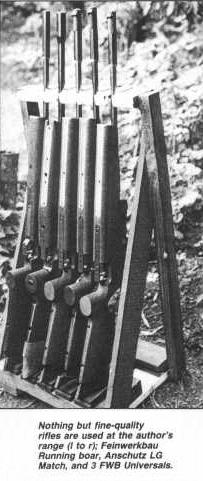
Once you have tried it, the pleasures of MiniSniping will be so obvious that I strongly doubt you'll ever quit. I know at least ten people who, in the past few months, have purchased Olympic-style airguns based just on a couple of hours shooting at our club as guests. Ten shots will show you-especially if there is a bit of wind-that it is the exact microcosm of long-range centerfire competition. If it still sounds like another BB-gun game let me point out that the membership of our coven consists of probably the finest collection of marksmanship perfectionists - bar me, I still trying - on the continent of Africa. Although rank hardly indicates expertise under normal circumstances, we nonetheless have three lieutenant generals, including the past and current Chiefs of the Air Force, the Chief of the Counter-Insurgency Unit of the Police, the former Secretary for Defense, (who is also Africa's best-known shooting writer), the former Consul General to Angola and now the head of the Army Advanced Marksmanship Unit plus being the top individual rifleman in the South African Defense Force. With the same pioneer heritage that Americans share, I promise you that these boys are real shooters. Two, in fact, are "Springbucks" which is roughly the rating you would receive if you made the U.S. Olympic team, relative to South Africa. Of course, in the name of warm international relations and the mutual understanding of all peoples, South Africa is not permitted to Olympics although the entire communist block is. Ah, well, back to MiniSniping...
Before going on to the miraculous properties of these rifles when fired by anybody but me, the short and very happy history of MiniSniping is worth a word. During the guerilla war in the old Portuguese overseas province of Angola in West Africa, two men with the same screwball shooting interests we all share fell under each others' influence. They were the two Mikes, Slightham and Malone. The first was a British businessman then living in the embattled capital of Luanda and the second, my good friend, a Dublin-born pistol shooter who had in his trophy caase more hard-earned gold than a dental supply house. Malone was, at that time, the ranking South African diplomat in the country. Bored by the restrictions of the war, the two started shooting airguns under a set of regulations dreamed up by the Briton, now enshrined here as the Slightham Rules. The Marquis of Queensberry was never more revered. I've always particularly loved this one, Number Three, related from the Chronicles of early Days: "In the instance of a competitor having a mortar bomb explode within 60 meters of his shooting position whilst he is in the act of firing, the shot may be repeated."
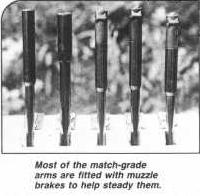
The original MiniSniping was done very differently from the sport as it has developed today. Break-barrel airguns typified by the Feinwerkbau 124, Weihrauch HW55, Webley Vulcan, and the later Beeman R1 were used to "countersnipe" at 5 1/4 inch clay men at about 30 meters (33 yards) from an elbow supported position on a table. Naturally, from that point, the arms race was on and the first tape at the finish line broken the day Denis Earp walked in with a FWB 300S Universal. To call a rifle of the quality of the FWB 300S series a "pellet gun" is rather like saying that Beluga Malossol caviar is just fish eggs and that Bo Derek is female. Both assertions are correct, but there's something irretrievably lost in the translation...
That was about three years ago and Denis shot the competitions' collective ears off, even using iron diopter sights against scopes. Today, the shooter can hardly even see the targets with the naked eye, but even then Denis must have had a well-dressed eye. Things have developed as you would have expected, so let me now describe the current state of the art. Of our members, all use either the FWB 300S Universal (the latter designation indicating that the model is adapted for metallic as well as scope sights, also featuring a metal track on the lower side of the forearm for a palm rest), the FWB Running Boar or Moving Target model or the Anschutz LG Match 380 rifle, which has proved no a bit more or less accurate than the FWBs.
Mike Malone may have caught it perfectly when he observed that shooting any of the really precision airguns was rather like using a fine microscope. Every time you pick it up, the "zero" seems to completely change, so delicate are the guns. True, but then, so is the quality of their performance. I have shot most of the real precision rifleman's games and have yet to find one less forgiving that MiniSniping.
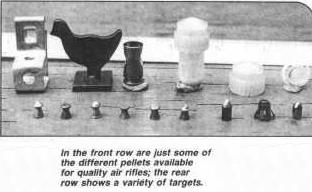
Essentially, given ordinary ambient and sometimes violent wind, the trick is to hit a target almost exactly twice the width of your pellet at considerably better than the relative equivalent of 1,000 yards. Because the rifles are so fine, there is absolutely no room for error. The shooter must interpret wind and mirage with not the slightest less care than used at a full 1,000 yards, plus. If you reckon this is easy, give it a try.
I can't resist mentioning that we had a guest at our shoot yesterday who scared everybody to death by shooting an initial five of six with a borrowed rifle. Of course, the wind was in the rare state of being completely "dead". He was, naturally, a really fine shot but over his next five rounds he took a total of only five men out of a possible 30. Learning hold-off and wind with MiniSniping is a separate act.
The MiniSniping rifles described are all scoped, the current high magnification being a couple of 10Xs, one of which is my Weaver KT-10 with a very small fraction of a minute dot at the center. Mike Malone, otherwise considered a gentleman, uses a Leupold 3.5-10x with crosshairs, which brings him to a depressing number of winds.
The pellet velocities of the MiniSniping rifles run, from our chronograph tests, at an average of slightly below 600 feet per second (fps). Their consistency is, however, exemplary. Their center-to-center capability of grouping runs to an advertised one-tenth of an inch at ten meters in most cases, and frankly, I think the rifles are understated at what they are capable of at 35 meters or yards. Beyond that, the lack of weight and sectional density of the pellets render them impotent for any course beyond perhaps 50 yards.
Should you decide to join the MiniSniping ranks, there is a very important aspect to your choice of a rifle /scope combinations. This has to do with loading and should rule out your selection of an FWB Universal Model, as fine a gun as it is. The experience of the members has shown that the "Universal," having a central top-loading breech, in fact tends to occlude the breech with a standard scope over 7x so there just isn't room for a pellet and your fingers, too. Both the FWB Running Boar and the Anschutz have canted or tight handed loading positions that permit a scope of extreme length. Were I to do it again, and I surely will, I'd go for a scope of 16x or even 20x - provided it had a focus and parallax adjustment to 35 yards, given the absolute precision of the sport.
Since you wouldn't stand a chance shooting against scoped rifles with mere iron sights in a game of this delicacy, there's another factor in the choice of a rifle that actually works for you wallet. The "Running Boar" model of the FWB 300S is - or at least was in July of 1983 - a cool $127 cheaper than the Universal, $698 against $825. The reason is that you're not paying for the diopter sights and their underpinnings, nor for the track under the forestock. The cheekpiece on the Running Boar is spring loaded with a tension knurl while the Universal comes with two separate cheekpieces. I personally prefer the adjustable feature; it's apparently cheaper, too. True, the Running Boar model won't take the accessories the more expensive models will, but if you're going in for MiniSniping you won't need them anyway. Why pay for them?
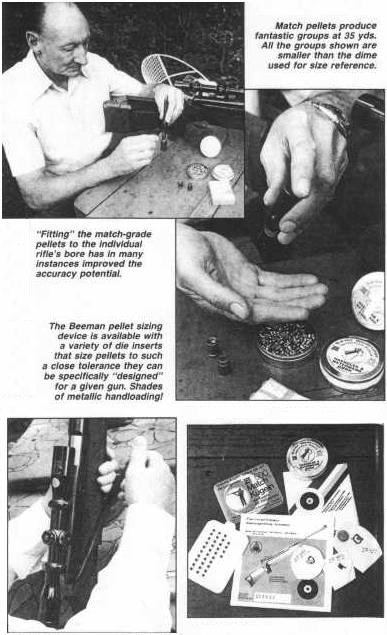
Let's face it, guns of all types cost much more today than they used to, but when the actual cost of shooting is compared between firearms and even the most expensive airguns you will realize in one big hurry that pellets haven't escalated in cost anywhere relative to the price today for centerfire or even .22 rimfire. I can shoot all afternoon - about 100 rounds of the most expensive .177 pellets I can find - for slightly over the cost of a single .30-06 cartridge and much less than the price of one .458 Winchester Magnum round. Since last July, I reckon I have put at least 20,000 pellets through my FWB. Despite having been a professional hunter and shooter, I have never had that kind of use from any arm I owned, nor has any other rifle given me more days and hours of pleasure. Once your initial investment is covered, there's no better value for you shooting money, especially considering the unbelievable quality of performance these rifles are capable of.
MiniSniping can be set-up virtually anyway you want to try it, and with any size target. I mentioned that good field - grade accuracy guns were originally used on modeling clay "men" over 5 inches high. Today, they would seem gargantuan but then the equipment we use is so precise in comparison with that of the early sport. So, let me describe the range and the sport by the rules we play.
We shoot at a measured 35 yards (despite the fact that South Africa is metric) against a plywood or other pellet-stopping board about 4x4 feet. This board is covered with a sheet of large dimension poster paper on which targets are drawn for zeroing and also to gauge the wind-drift of misses when shooting at the actual "snipers." There are six targets, and although we use 9mm empty cases, you may choose something larger such as half a kitchen cabinet hinge or maybe the little plastic centrifuge containers that dentist buy their cavity filling compound in. If you're a good customer, maybe you can talk your dentist into saving them for you. On a quiet day with a little wind, you can actually shoot at the tiny inside cap liners rather than at the containers themselves. Bottle caps held on edge by the modeling clay are also good targets and offer good visibility. We've had a lot of fun with the scaled down metallic silhouettes offered by Beeman and others, especially if we decided to vary the game by firing offhand. They are realistic and with their different sizes may be varied in range out to 50 yards, as per the instructions.
All MiniSniping targets are placed on rocks or stones of a size about double that of your fist; sometimes bricks or half-bricks are used. Lead pellets normally smear or rebound only a few feet, but for Heaven's sake, don't try this with steel BBs as they will almost certainly rebound and ricochet dangerously.
Given the extraordinary grouping abilities of these rifles, the real challenge of MiniSniping is the same of that of any long range shooting: judge the wind. Normally, two wind indicators are used on our ranges. The first is about 8 yards ahead of the bench and the other about the same distance ahead of the backboard. We have found that strips of toilet tissue are ideal, being light enough to show each twitch of breeze. One important hint, though, the closer flag is a better indicator than the farther,
And don't ask me why. Unless you're shooting on the Bonneville Salt Flat, wind will be swirled and eddied by buildings, trees and shrubs to such an extent that it's rarely reliable where a lightweight pellet is concerned. Often the two flags show opposite drifts, at 180 degrees to each other although they're less than 20 yards apart! Thus, MiniSniping is a game of pure hold-off shooting, the best test of a rifleman, unless the wind is absolutely dead. This need for "reading" wind and individual judgment are what make it the grand sport it is. It'll take you some time to "learn" the flags, but they are absolutely vital. I'd sooner try to compete without my rifle than without those strips of tissue.
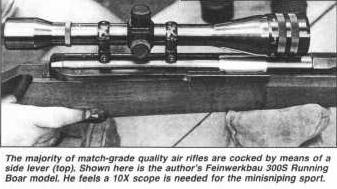
We normally shoot from a proper bench rest, a heavy wooden table, and use either foam rubber patio furniture covers as rests or a formal sand-filled leather sandbag. Since the real challenge is to judge air currents accurately and hold-off accordingly for a 7 grain pellet over such distances, shooters may use any rest or position they wish. We haven't seen any real difference in scores despite the greater firmness of the sandbags over the foam rubber. If you don't happen to have a proper bench rest, any firm table will do, even one that folds.
On first arriving at the range - and be sure that it is legal to discharge an airgun at your proposed location - every shooter is permitted to zero with as many rounds as is necessary. As most guns will have been cleaned since the last session either with a rod and patches or a series of felt cleaning pellets, they usually take a bit of "settling down" with a series of shots to get back into rough zero. When everybody is zeroed on the tiny target drawn on the background paper, the competitors flip coins to determine their order of shooting.
From this point on, each person fires in rotation beginning with two additional zeroing shots to gauge wind at the beginning of each round. A great piece of advice is to always take those two "zeroers" as to start directly firing at the "snipers" for some reason seems to usually produce poor scores. Perhaps it's a matter of the barrel temperature and subsequent constriction or expansion after a period of non-use, but it's also an indication of the sensitivity of these guns. It is customary, but not required, to begin shooting at the first or left hand target. Some targets may be more exposed than others. Six shots are permitted, one at each "man", although there are circumstances in which a shooter may choose to fire more than once at the same target even though his limit is six shots. To score a "kill" the target must be knocked free of his clay moorings. A crease that tilts or otherwise moves him without actually blowing him over is a miss - no walking wounded in this savage game! As a leftover from the original Slightham Rules, though, a man bumped off his perch by the flying body of one of his fellows or caught by a ricochet counts as dead. The idea is that snipers are as subject to the risk of a stray bullet as anybody else on the battlefield and, after all, war is war. Should a perfect score of size be shot with only five pellets or less because of this freak happening, there is no extra score. However, each shooter has the right to his full six shots, perhaps firing twice at a man he has missed if he has had the luck to have collected two men with a single pellet. Shots may not be carried over as extras to a subsequent round.
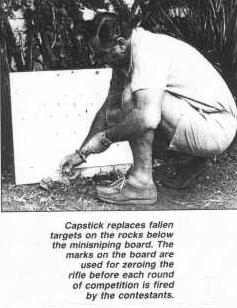
So, despite my efforts to make it sound tricky, MiniSniping is absolutely simple. Two practice shots at the paper targets and six at the men. Each "kill" counts on point. The most points win.
After firing a round, it is the immediate duty of each previous shooter to walk downrange and set the "snipers" back up. Of course, the following shooter may not load until the previous is back behind the bench. We keep a running tally in a notebook to see who is high gun each session.
Essentially, MiniSniping incorporates every aspect of big-bore, long-range shooting. Wind drift and hold-off are proportionate and every technique of Bisley-style competition is present. So exacting is the game that there is not a single nuance of breath and trigger control, let-off and follow-though that is not equally essential for good scores. Even the use of custom ammo is a big part of the sport today.
Since any rifle - or handgun, for that matter - is only as good as the ammo it fires, the selection of pellets for MiniSniping takes a lot of consideration and actual time at the shooting bench. It may be true that they're all the same caliber, but precision match airgun barrels are as different in their taste for pellets as women are about perfume. Just remember that every barrel is an individual with its own characteristics that clearly shows a preference for one brand or type of pellet over another. My Running Boar thinks that H&N Match Kugeln wadcutters, individually hand-selected and packed in sheets of oil and foam, are gumdrops. These are the same pellets, the top 20 percent of factory lots after testing, that are imported by Beeman to the U.S.A. under the "Super Match." Well, that's my rifle. Mike Malone and Vladimir Steyn have both found that H&N semi-wadcutter Hollow Point Diabolo suit their Universal and Anschutz better, giving definitely finer groups. These are packed in tins and, despite the fact that they are more subject to deformation as they are not insulated one pellet from the next, certainly are the right fodder for their rifles. Denis Earp shoots a pointed German pellet that doesn't do at all well in any of the other club rifles, but seems perfect for his Universal. This isn't an ad for any particular brand, the important thing being to experiment carefully under calm wind conditions and see by experimentation which pellet brand and type your rifle likes best. Considering the potential performance of your fine rifle, I would also suggest that you use only match quality ammo. After all, you wouldn't try to run a Maserati or Ferrari on kerosene.
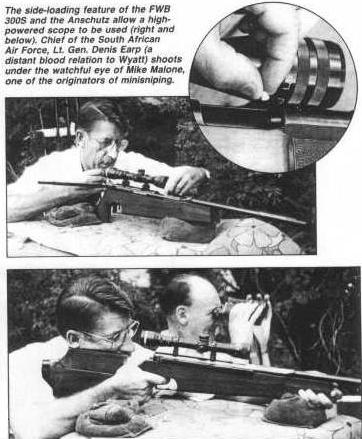
A very handy gadget to accumulate is the Beeman Pellet sizer which, if you want to part with the price of a couple of good steak dinner, can be bought with a series of dies that size or constrict the skirt of a pellet to a particular diameter, depending on which internal collar you have in the tool. If ultimate accuracy is your aim, then it's a must. I'm still experimenting and have found that my rifle seems to like the Match ammo right out of the box, although I have seen a noticeable difference when I was using other brands sized to different diameters.
Obviously, the most important consideration with all pellets, soft lead that they are, is that they be consistent and undamaged. Each one should be carefully inspected by eye for dents and deformations before loading, and discarded if they don't look mint-issue. And, don't expect a sizing die to reform bent or damaged pellets. It simply won't.
This being Darkest Africa, there are more ways of obtaining peak performance from one's rifle/pellet combination than using a sizing die. One of our members was recently censured and heavily fined by the Ethics Committee, having been caught sewing a tin of pellets into the breast of a newly-killed chicken at the full moon. Two other have reputedly rented full-time Sangomas, or witch doctors.
In today's world of increasing population, more cramped shooting
conditions often requiring miles of driving to a range, and the
spooky cost of not only rifles but ammo, MiniSniping seems to be
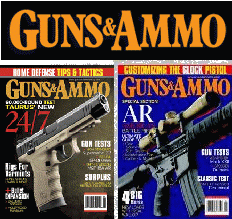 the answer to the serious urban rifleman, especially one who might
want to pass on his own heritage by teaching a son or daughter the
art of fine marksmanship. Granted, you can't very well MiniSnipe
in Time Square, but at least you won't need a whole morning to
driver to a suitable spot. So, the advantages of the sport are
that it's almost silent (the pellet hitting the board makes almost
more noise than the shot itself), once past the initial investment
it's the cheapest real shooting you can do; it relates exactly to
all aspects of big-bore range work such as silhouette or falling
plate. It's convenient, quiet, immensely challenging and as
typified by the FWB300S and the Anschutz, it's completely recoilless
so young and new shooters don't have to fight the flinch barrier
to really good shooting.
the answer to the serious urban rifleman, especially one who might
want to pass on his own heritage by teaching a son or daughter the
art of fine marksmanship. Granted, you can't very well MiniSnipe
in Time Square, but at least you won't need a whole morning to
driver to a suitable spot. So, the advantages of the sport are
that it's almost silent (the pellet hitting the board makes almost
more noise than the shot itself), once past the initial investment
it's the cheapest real shooting you can do; it relates exactly to
all aspects of big-bore range work such as silhouette or falling
plate. It's convenient, quiet, immensely challenging and as
typified by the FWB300S and the Anschutz, it's completely recoilless
so young and new shooters don't have to fight the flinch barrier
to really good shooting.
I've told you about all that space permits of the noble art of MiniSniping. Regretfully, I can't be more help in the matter of customizing pellets but to say that personally, I prefer to leave these matters to a properly qualified witch-doctor. Probably your best bet would be the Yellow pages?
Note To Reader: This article was published back in 1984. As such,
some of the data is outdated.
Top of Page
© Copyright 2007 by Brad Troyer & MiniSniping.Org